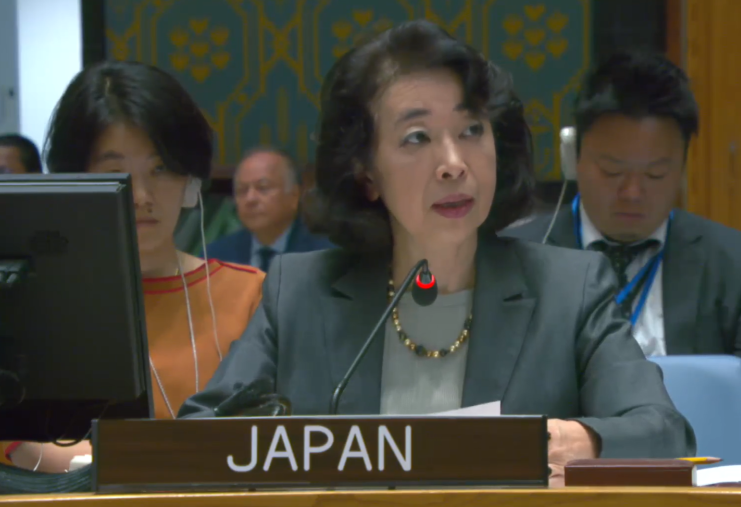マリ情勢に関する安保理ブリーフィングにおける志野大使ステートメント
令和5年8月28日

(As delivered)
Thank you, Madam President,
I thank SRSG Wane and Ms. Abouya for their insightful briefing. I also welcome the participation of the representative of Mali.
We are at a critical juncture for the peace and stability of Mali and the Sahel region. We are already seeing the adverse impact of the hasty withdrawal of MINUSMA. The deteriorating security situation around the Ber camp is deeply concerning. The 2015 Peace Agreement is the only existing framework to achieve durable peace and reconciliation and must be upheld. Japan calls on all parties to refrain from any actions that could jeopardise the Agreement.
Today I want to reiterate three points as MINUSMA withdraws from Mali.
First, the orderly and safe withdrawal of the Mission. Japan is deeply disturbed by attacks on withdrawing MINUSMA convoys and the restrictions imposed on MINUSMA, including freedom of movement and access to their imports and exports. While recognizing the frequent consultations held at various levels on the withdrawal process, Japan reiterates its call on the Malian authorities to cooperate fully with the UN and stresses the need to respect all provisions of the Status of Forces Agreement until the final element of MINUSMA departs Mali.
Second, the smooth and proper transfer of MINUSMA’s tasks. Long-term UN engagement in Mali is essential and Japan commends ongoing efforts for the transfer. At the same time, we are deeply concerned to learn that some tasks performed by the Mission may not be handed over due to the compressed timeline for the Mission’s withdrawal. We call on the Malian authorities, the Mission, the UN country team, UNOWAS, and other relevant stakeholders to closely coordinate and collaborate further in the coming months.
Third, the importance of adhering to international obligations. Japan notes that MINUSMA’s tasks will be transferred primarily to the transitional government. At the same time, the capacities of the UN to deliver humanitarian aid and support the protection of civilians or human rights will be severely impacted by the Mission’s rapid withdrawal. In this connection, we underscore the obligation of the Malian authorities and foreign security personnel to comply with international law, including international human rights law and humanitarian law, in all its operations.
Madam President,
The deteriorating security situation in Mali and its effect on the region requires closer attention by the Security Council. The Council must continue its engagement with the Malian authorities and regional actors. Safeguarding and promoting the implementation of the 2015 Peace Agreement, as well as a ensuring a return to constitutional order by March 2024, are crucial.
Japan emphasizes the importance of the continued involvement of the entire UN system including UNOWAS and notes the call for the requisite financial and resource arrangements.
I conclude by reaffirming Japan’s commitment to engage constructively in the discussion and to contribute to sustainable peace in Mali and beyond.
I thank you.
I thank SRSG Wane and Ms. Abouya for their insightful briefing. I also welcome the participation of the representative of Mali.
We are at a critical juncture for the peace and stability of Mali and the Sahel region. We are already seeing the adverse impact of the hasty withdrawal of MINUSMA. The deteriorating security situation around the Ber camp is deeply concerning. The 2015 Peace Agreement is the only existing framework to achieve durable peace and reconciliation and must be upheld. Japan calls on all parties to refrain from any actions that could jeopardise the Agreement.
Today I want to reiterate three points as MINUSMA withdraws from Mali.
First, the orderly and safe withdrawal of the Mission. Japan is deeply disturbed by attacks on withdrawing MINUSMA convoys and the restrictions imposed on MINUSMA, including freedom of movement and access to their imports and exports. While recognizing the frequent consultations held at various levels on the withdrawal process, Japan reiterates its call on the Malian authorities to cooperate fully with the UN and stresses the need to respect all provisions of the Status of Forces Agreement until the final element of MINUSMA departs Mali.
Second, the smooth and proper transfer of MINUSMA’s tasks. Long-term UN engagement in Mali is essential and Japan commends ongoing efforts for the transfer. At the same time, we are deeply concerned to learn that some tasks performed by the Mission may not be handed over due to the compressed timeline for the Mission’s withdrawal. We call on the Malian authorities, the Mission, the UN country team, UNOWAS, and other relevant stakeholders to closely coordinate and collaborate further in the coming months.
Third, the importance of adhering to international obligations. Japan notes that MINUSMA’s tasks will be transferred primarily to the transitional government. At the same time, the capacities of the UN to deliver humanitarian aid and support the protection of civilians or human rights will be severely impacted by the Mission’s rapid withdrawal. In this connection, we underscore the obligation of the Malian authorities and foreign security personnel to comply with international law, including international human rights law and humanitarian law, in all its operations.
Madam President,
The deteriorating security situation in Mali and its effect on the region requires closer attention by the Security Council. The Council must continue its engagement with the Malian authorities and regional actors. Safeguarding and promoting the implementation of the 2015 Peace Agreement, as well as a ensuring a return to constitutional order by March 2024, are crucial.
Japan emphasizes the importance of the continued involvement of the entire UN system including UNOWAS and notes the call for the requisite financial and resource arrangements.
I conclude by reaffirming Japan’s commitment to engage constructively in the discussion and to contribute to sustainable peace in Mali and beyond.
I thank you.
